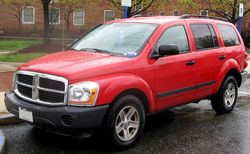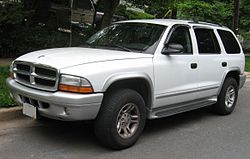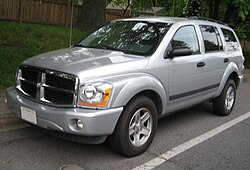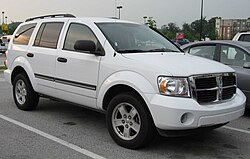Dodge Durango
| Dodge Durango | |
|---|---|
 | |
| Overview | |
| Manufacturer | Chrysler |
| Production | 1998–2009, resumes 2012. |
| Assembly | Newark, Delaware, United States |
| Body and chassis | |
| Class | Mid-size SUV (1998-2003) Full-size SUV (2004-2009) Full-size crossover SUV (2011-) |
| Body style | 4-door SUV |
| Layout | Front engine, rear-wheel drive / Four-wheel drive |
| Chronology | |
| Predecessor | Dodge Ramcharger |
The Dodge Durango is a full-size SUV from Chrysler's Dodge brand. It was introduced in 1998 as a mid-size SUV, and as a replacement for the Ramcharger discontinued in the North American market in 1993, and was redesigned for 2004. The Durango was produced at the Newark Assembly plant in Newark, Delaware until the end of 2008. The Durango will return in 2012 on a shared platform with the Jeep Grand Cherokee.
1998–2003
| First generation | |
|---|---|
 | |
| Overview | |
| Production | 1998–2003 |
| Body and chassis | |
| Class | Mid-size SUV |
| Platform | Chrysler DN platform |
| Related | Dodge Dakota |
| Powertrain | |
| Engine | Template:Auto Lrev Magnum V6 Template:Auto Lrev PowerTech V8 Template:Auto Lrev Magnum V8 Template:Auto Lrev Magnum V8 |
| Transmission | 4-speed TorqueFlite automatic |
| Dimensions | |
| Wheelbase | Template:Auto in |
| Length | Template:Auto in (2001-03) Template:Auto in (1998–2000) |
| Width | Template:Auto in (1998–2000) Template:Auto in (2001-03) |
| Height | Template:Auto in (2001-03) Template:Auto in (1998–2000) |
The Durango was marketed as a sturdy truck-based SUV designed to hold up to eight passengers and tow up to 8,950 lb (4,060 kg) when properly equipped.[1] The 4.7L PowerTech V8 replaced the 5.2L Magnum V8 engine for 2000. In that same year a special AWD performance version called the R/T was released with a 5.9L Magnum V8. In 1999 and 2000, a very limited edition Shelby S.P.360 version was offered that featured a supercharged version of the 5.9L Magnum V8 engine. Output is 360 bhp (268 kW; 365 PS) and 412 lb⋅ft (559 N⋅m) of torque. Exterior modifications include unique wheels, tires, suspension, and bumpers. It came standard with Viper blue paint with two racing stripes down the center of the truck. It boasted a 0-60 mph time of 7.1 seconds. The top speed was 142 mph (229 km/h)
1998: First model year for Durango, available only in 4WD.
1999: The Durango was now available in a 2WD model. Minor changes were made for the 2nd year, two new paint colors and notable options available including 6" X 9" heated rear view mirrors and steering wheel mounted radio controls. Leather seats are now standard on SLT Plus models, and body color wheel flares are standard on SLT Plus and 4WD Models.
2000: The new 4.7L Magnum V8 engine replaced the 5.2L Magnum V8 as the standard engine for 4WD models. The high performance Durango R/T came equipped with a performance tuned 5.9L Magnum V8 and AWD.
2001: Dodge focused on interior upgrades as Durango's interior trim panels, dash mounted controls, instrument panel, overhead console, and steering wheel were all redesigned. For improved rear passenger comfort, a dual-zone climate control system was now standard. Sound systems were improved on all models and now came standard with 6 speakers. Other minor changes include door panels, revised seats, aluminium wheels, and minor changes to trim options.
2002: The new SXT version of the Durango was offered as the entry-level trim package. Optional side curtain airbags were added for safety.
2003: Durango featured minor mechanical changes, most notable was the addition of 4 wheel disc brakes.
Trim levels
- 1998–2003 - SLT
- 1998–2003 - SLT PLUS
- 1999–2001 - Sport
- 2001–2003 - SXT
- 1999–2003 - R/T
Engines
- 1998–2000 — Template:Auto Lrev Magnum V8, 230 hp (172 kW)
- 1999–2000 — Template:Auto Lrev Magnum V6, 175 hp (130 kW)
- 1998–2003 — Template:Auto Lrev Magnum V8, 245 hp (183 kW)
- 2000–2003 — Template:Auto Lrev Magnum V8, 250 hp (186 kW)
- 2000–2003 — Template:Auto Lrev PowerTech V8, 235 hp (175 kW)
2004–2009
| Second generation | |
|---|---|
 2004–2006 Dodge Durango SLT  2007–2009 Dodge Durango | |
| Overview | |
| Production | 2003-2008 |
| Model years | 2004–2009 |
| Body and chassis | |
| Class | Full-size SUV |
| Related | Chrysler Aspen Dodge Dakota |
| Powertrain | |
| Engine | Template:Auto Lrev PowerTech V6 Template:Auto Lrev PowerTech V8 Template:Auto Lrev Hemi V8 |
| Transmission | 4-speed 42RLE automatic |
| Dimensions | |
| Wheelbase | Template:Auto in |
| Length | Template:Auto in Hybrid: Template:Auto in |
| Width | Template:Auto in |
| Height | Template:Auto in Hybrid: Template:Auto in |
2004–2006
The second generation Durango debuted shortly before the companion Dakota. Like the Dakota, it has much in common with the large Dodge Ram pickup, including a fully-boxed frame. It is Template:Auto in longer, Template:Auto in wider, and Template:Auto in taller than the previous model. For this model year, it offered a full-size third row bench with three seats, giving it an 8 seat capacity. The design took its styling primarily from the Dodge Powerbox concept which was itself based on the Dodge Power Wagon Concept.
Debuting for 2004 was an all-new rear suspension with coil springs and a solid rear axle. A Watt linkage system is fitted to the rear axle, centering the axle and reducing rear-end skate over rough surfaces, and allowing a lower and wider cargo floor.
2007–2009
The 2007 model was reworked to halt a sales decline, debuting at the Dallas Auto Show in April 2006. It featured a redesigned grille, hood, headlamps, fenders and wheels. New features included electronic stability program, tire pressure monitoring system, rear park assist, and a one-touch turn signal. The 2007 model also featured a reworked floor, third-row bench, and electrical system in preparation for the 2009 hybrid version. In 2007 Chrysler introduced its own version of the Durango, called the Chrysler Aspen.
Hybrid
Chrysler started to build the Dodge Durango Hybrid 2009 in fall 2008,[2] featuring the 340 hp (254 kW) Template:Auto Lrev Hemi engine with MDS as well as the new Two-Mode Hybrid system developed with General Motors and BMW. The manufacturer claimed an almost 25% gain overall fuel fuel economy and an almost 40% gain in the city.[3] EPA testing on the Hybrid Durango with the Hemi V8 engine indicates fuel mileage to be about 20 miles per US gallon (12 L/100 km; 24 mpg‑imp) (city) and 22 miles per US gallon (11 L/100 km; 26 mpg‑imp) (highway) for 2009 model.[4] The normal (non-hybrid) Durango with the Template:Auto Lrev Hemi and 4WD gets 13 miles per US gallon (18 L/100 km; 16 mpg‑imp) (city) and 19 miles per US gallon (12 L/100 km; 23 mpg‑imp) (highway).[5]
The 2009 Dodge Durango Hybrid has a starting MSRP of $45,340.[6] Production of the hybrid models (this included Chrysler Aspen Hybrid as well) began on August 22 2008. Chrysler received approximately 3000 pre-orders from dealers. By early November 2008, 400 of the hybrid S.U.V.’s, including Chrysler Aspen, had already been built.
Trim levels
- SXT 2004–present
- SLT 2004–present
- SLT Plus 2004–2009
- Night Runner 2005–2007
- Limited 2004–present
- Adventurer 2005–2008
Engines
- 2004–2009 - Template:Auto Lrev PowerTech V6, 210 hp (157 kW) at 5200 rpm and Template:Auto lbft at 4000 rpm
- 2004–2007 - Template:Auto Lrev PowerTech V8, 235 hp (175 kW) at 4500 rpm and Template:Auto lbft at 3600 rpm
- 2004–2009 - Template:Auto Lrev Hemi V8, 335 hp (250 kW) at 5200 rpm and Template:Auto lbft at 4200 rpm (MDS equipped for 2006+ 5.7L engines for improved fuel mileage)
- 2007–2009 - Template:Auto Lrev flex-fuel PowerTech V8, 235 hp (175 kW) at 4500 rpm and Template:Auto lbft at 3600 rpm
- 2008–2009 - Template:Auto Lrev PowerTech V8, 303 hp (226 kW) at 5,650 rpm and Template:Auto lbft at 3,950 rpm (3 valves per cylinder)
Discontinuation and future
On October 23, 2008, Chrysler announced that the shutdown of the Newark Assembly facility producing the Dodge Durango and Chrysler Aspen would be moved up to the end of 2008, effectively ending production of the Durango and Durango Hybrid for the 2009 model year. [7]
The third generation of Durango has been rumored to appear within the 2012 Dodge lineup, returning in production by the end of 2011. According to the company plans, the new Durango would feature an SUV platform Dodge is currently working at, but would much rather be a full-size CUV instead, its truck place presumably taken by 2012 Jeep Commander and Grand Cherokee in the lineup.[8]
Total American sales
| Calendar Year | Sales |
|---|---|
| 1999[9] | 189,840 |
| 2000 | 173,567 |
| 2001[10] | 130,799 |
| 2002[11] | 106,925 |
| 2003 | 108,010 |
| 2004[12] | 137,148 |
| 2005 | 115,439 |
| 2006[13] | 70,606 |
| 2007 | 45,503 |
| 2008[14] | 21,420 |
| 2009[15] | 3,521 |
References
- ^ "Top 10 Vehicles for Towing" Edmunds.com, retrieved on 2010-02-08.
- ^ Bloomberg: Chrysler to Drop First Hybrids, After October Debut (Update2)
- ^
"hybrid: two-mode system". Dodge.com. Retrieved 2008-11-20.
The 2009 Durango HEMI Hybrid takes that a step further with its two-mode system that integrates a hybrid-electric drive system – which reduces fuel consumption by almost 40 percent[1] while running errands in town<...> The payoff is an increased overall fuel economy of nearly 25 percent.
{{cite web}}: Cite has empty unknown parameters:|month=and|coauthors=(help); line feed character in|quote=at position 64 (help) - ^ Chrysler's new hybrid SUVs score a 20/22 mpg from the EPA
- ^ www.fueleconomy.gov, 2009 Dodge Durango 4WD
- ^ Ross, Jeffrey N. (2008-06-17). www.autotropolis.com ""Chrysler announces starting MSRP for 2009 Dodge Durango HEMI Hybrid"". Autotropolis.com. Retrieved 2008-06-17.
{{cite web}}: Check|url=value (help) - ^ Edmunds Insideline: Chrysler Kills Durango and Aspen Hybrids
- ^ Upcoming changes in the Chrysler lineup, November 2009
- ^ "Chrysler Group Announces Year-End and December Sales". Theautochannel.com. Retrieved 2009-04-28.
- ^ "Chrysler Group Reports U.S. December Sales". Theautochannel.com. Retrieved 2009-04-28.
- ^ "Chrysler Group Reports December 2003 Sales Increase of 2 Percent". Theautochannel.com. 2004-11-17. Retrieved 2009-04-28.
- ^ "Chrysler Group 2005 U.S. Sales Rise 5 Percent, Highest Since 2000; December Sales Decline In Line with Overall Industry". Prnewswire.com. Retrieved 2009-04-28.
- ^ "Total Chrysler LLC December 2007 Sales Up 1 Percent on the Strength of Retail; Demand..." Reuters. 2008-01-03. Retrieved 2009-04-28.
- ^ "Chrysler LLC Reports December 2008 U.S. Sales". News.prnewswire.com. Retrieved 2009-04-28.
- ^ "Chrysler Group LLC Reports December 2009 U.S. Sales". www.CheersandGears.com. Retrieved 2010-01-05.
